American Religion
- 格式:doc
- 大小:33.50 KB
- 文档页数:5
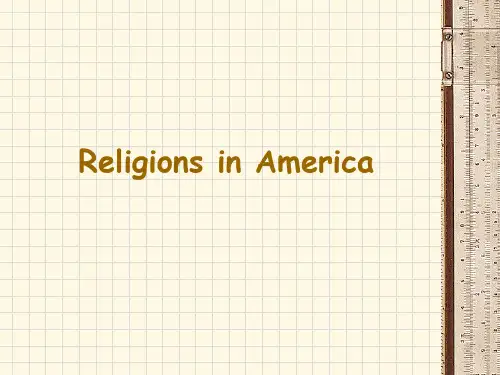
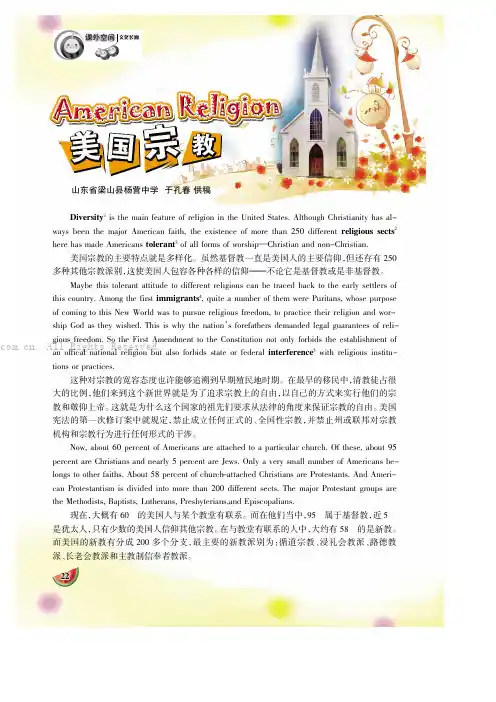
课外空间文化长廊山东省梁山县杨营中学于孔春供稿Diversity1is the main feature of religion in the United States.Although Christianity has al-ways been the major American faith,the existence of more than250different religious sects2here has made Americans tolerant3of all forms of worship—Christian and non-Christian.美国宗教的主要特点就是多样化。
虽然基督教一直是美国人的主要信仰,但还存有250—不论它是基督教或是非基督教。
多种其他宗教派别,这使美国人包容各种各样的信仰——Maybe this tolerant attitude to different religions can be traced back to the early settlers ofthis country.Among the first immigrants4,quite a number of them were Puritans,whose purposeof coming to this New World was to pursue religious freedom,to practice their religion and wor-ship God as they wished.This is why the nation’s forefathers demanded legal guarantees of reli-gious freedom.So the First Amendment to the Constitution not only forbids the establishment of. All Rights Reserved.an offical national religion but also forbids state or federal interference5with religious institu-tions or practices.这种对宗教的宽容态度也许能够追溯到早期殖民地时期。
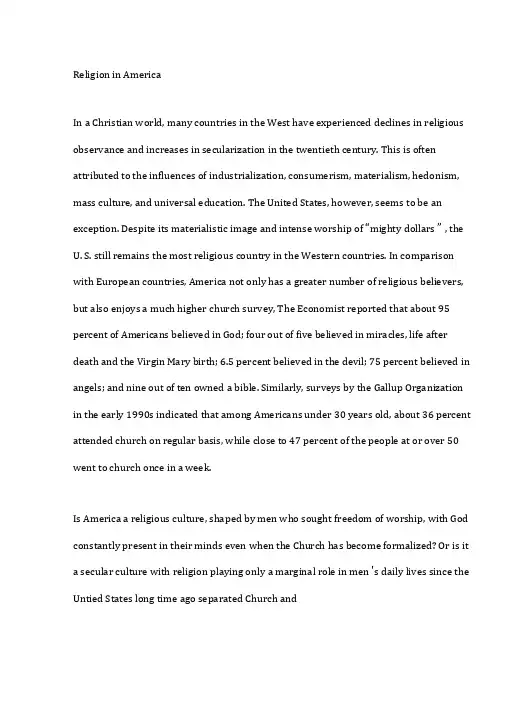
Religion in AmericaIn a Christian world, many countries in the West have experienced declines in religious observance and increases in secularization in the twentieth century. This is often attributed to the influences of industrialization, consumerism, materialism, hedonism, mass culture, and universal education. The United States, however, seems to be an exception. Despite its materialistic image and intense worship of “mighty dollars ” , the U. S. still remains the most religious country in the Western countries. In comparison with European countries, America not only has a greater number of religious believers, but also enjoys a much higher church survey, The Economist reported that about 95 percent of Americans believed in God; four out of five believed in miracles, life after death and the Virgin Mary birth; 6.5 percent believed in the devil; 75 percent believed in angels; and nine out of ten owned a bible. Similarly, surveys by the Gallup Organization in the early 1990s indicated that among Americans under 30 years old, about 36 percent attended church on regular basis, while close to 47 percent of the people at or over 50 went to church once in a week.Is America a religious culture, shaped by men who sought freedom of worship, with God constantly present in their minds even when the Church has become formalized? Or is it a secular culture with religion playing only a marginal role in men 's daily lives since the Untied States long time ago separated Church andState? To answer these two questions is no less than looking into the dynamics of American culture and the complexity of American society. The fact of the matter is that each of these questions can be answered affirmatively. America is as secular as a culture can be where religion has played an important role in its origins and early growth, and has been interwoven with the founding and meaning of the society. America is also as religious as a culture can be whose life goals are worldly and whose daily strivings revolve not around God but around Man.God and ManThe mixture of theocracy and secularism is actually one of the American religious heritages. One can find the strong religious base of American life and thought in the older Puritan communities of New England and in the new frontier states. The Calvinist doctrine of predestination, for example, played a dominant role in the early colonists. People moving to the frontiers in the West were mostly inspired by the vast stretch of land available for attainment. They dreamed of getting rich quick, and at the same time tried to comfort their souls by waging religious revivals there. At the time Americans embraced Enlightenment ideas and applied them in their political, social and economic life, they still constantly referred to the Holy Scripture for conviction and reassurance. Even in the contemporary Atomic Age where science and technology has developed to an unprecedented level, there has been an activerevival of religious feeling among the American people, old and young, in modern cities. To a certain degree, this mixture of 17th-century rationalism (Science and Technology),and mid-20th-century revival may help explain some of the contradictions in the relations between God and Man in America. America is regarded as a “ Christian countinryfluence” o.f TJuhdea ic-Christiandoctrines upon American culture has been profound. For example, the religious doctrine of the soul is so crucial and pervasive in Western (including American) conceptions of man that no one would deny that Judaic-Christian doctrine is a major element in shaping American national character and culture. In the minds of American Christian believers, the idea that man has a soul and that all souls are “ equabl efore God”has been basic to the ethical evaluation of individual personality. The idea of the worth, dignity, and inviolability of the individual unquestionably owes much to this belief, as do humanitarian ideas and various philosophies of human equality.Historically speaking, the whole idea of God and individual soul goes back to the sixteenth century. As the child of the Reformation, Americans took over not only its dominantly Protestant heritage, but also its deep individualistic strain. Every European sect that had found itself constricted or in trouble emigrated to the New World, which thus became a repository of all the distillations of Reformation thought and feeling. Since the Reformation had broken with the authority of the Roman Catholic Church and left to the individual meaning of the Scripture, America became a congeries of judging individuals, each of themweighing the meaning and application of the Word. A Bible-reading people emerged, drenched in the tradition of the Old and New Testaments. This may help explain the stress on the idea of “ covenant withc aGno tdhoug”ht. inAmeriIt also suggests why a people so concerned with the meaning of the Holy Writ have been the first to give a sacred character to a written Constitution but at the same time remain a nation of amateur interpreters of the Constitution.Two basic concepts of the Christian —the soul and sin—took on a new emphasis in individualist America. Each man was the judge of his own religious convictions, since his possession of an immortal soul gave such an inner worth regardless of color, rank, or station, political belief, wealth or poverty. Thus, the foundation was laid for religious freedom early on in the Untied States. On the other hand, if each man had an immortal soul to save, it was because it had been steeped in sin. As a Bible-reading people, Americans took over many of the preconceptions of the Hebraic society in which Judaism and early Christianity were rooted. Among them was the sense of individual sin—aside from original, or inevitable sin—without which there could be no individual salvation.There is a resulting ambiguity between the sin-and-salvation strain in Christian doctrine and the organic optimism of American economic and social attitudes. The Hebrew prophets, as they lamented the disintegration of Biblical society, called on each Jew to ward off God' sw rath from his people by cleansing himself of his own inner guilt; the Christian allegory added to the somberness of this conception. But there have been few occasions on which Americans could believe with any conviction in an impending collapse of their social structure and their world. The sense of sin and the sense of doom were therefore importations from the Old and New Testaments that somehow floweredin the American soil in spite of worship of money and success, or, perhaps, exactly because of this worship, for in this case, it required a compensating doctrine to ease the conscience.The result has been an American religious tradition which is on the one hand deeply individualistic, anti-authoritarian, and concerned with sin and salvation, and yet, on the other hand, secular and rationalist in its life goals, and concerned with happiness in this world. Americans, growing up in this religious tradition, have been salvation-minded, each believer engrossed in his relation not to the church but to God, in Whom he was to find salvation. At the same time, they have also formed a secular rather than a sacred society, in which everybody pursued his earthly comforts according to his own conscience。
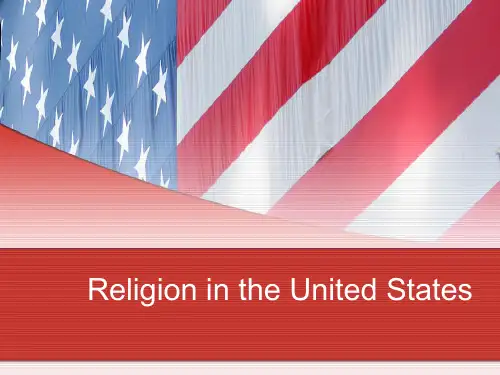
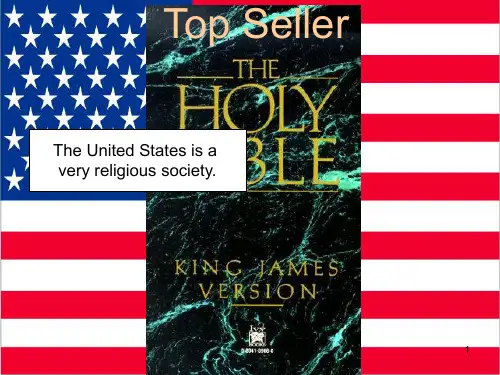
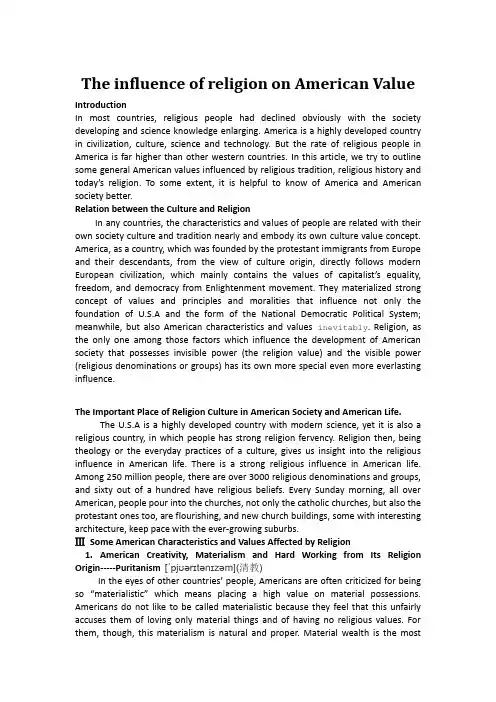
The influence of religion on American Value IntroductionIn most countries, religious people had declined obviously with the society developing and science knowledge enlarging. America is a highly developed country in civilization, culture, science and technology. But the rate of religious people in America is far higher than other western countries. In this article, we try to outline some general American values influenced by religious tradition, religious history and today’s religion. To some extent, it is helpful to know of America and American society better.Relation between the Culture and ReligionIn any countries, the characteristics and values of people are related with their own society culture and tradition nearly and embody its own culture value concept. America, as a country, which was founded by the protestant immigrants from Europe and their descendants, from the view of culture origin, directly follows modern European civilization, which mainly contains the values of capitalist’s equality, freedom, and democracy from Enlightenment movement. They materialized strong concept of values and principles and moralities that influence not only the foundation of U.S.A and the form of the National Democratic Political System; meanwhile, but also American characteristics and values inevitably. Religion, as the only one among those factors which influence the development of American society that possesses invisible power (the religion value) and the visible power (religious denominations or groups) has its own more special even more everlasting influence.The Important Place of Religion Culture in American Society and American Life.The U.S.A is a highly developed country with modern science, yet it is also a religious country, in which people has strong religion fervency. Religion then, being theology or the everyday practices of a culture, gives us insight into the religious influence in American life. There is a strong religious influence in American life. Among 250 million people, there are over 3000 religious denominations and groups, and sixty out of a hundred have religious beliefs. Every Sunday morning, all over American, people pour into the churches, not only the catholic churches, but also the protestant ones too, are flourishing, and new church buildings, some with interesting architecture, keep pace with the ever-growing suburbs.ⅢSome American Characteristics and Values Affected by Religion1. American Creativity, Materialism and Hard Working from Its Religion Origin-----Puritanism[ˈpjʊərɪtənɪzəm](清教)In the eyes of other countries’ people, American s are often criticized for being so “materialistic” which means placing a high value on material possessions. Americans do not like to be called materialistic because they feel that this unfairly accuses them of loving only material things and of having no religious values. For them, though, this materialism is natural and proper. Material wealth is the mostwidely accepted measure of social status in the United States because Americans rejected the European system of hereditary aristocracy and titles of nobility; they had to find a substitute for judging social status.However, Americans pay a price for their material wealth, which is hard working. When puritans settlers arrival this new land, all the rich natural resources were undeveloped. They believed God gave those treasures to them and only by hard work could these natural resources be converted into material possessions and a conformable standard of living as the reward for the God. Hardworking has been both necessary and rewarding for most Americans throughout their history. Because of this, they have come to see material possessions as the natural reward for their hardworking. Most Americans believe if a person works hard, it is possible to have a good standard of living. Over 90% of young Americans think they will achieve what they want in life, and almost eight out of ten think they can get what they want through hard work. They have been thought that it is a good thing to work hard and acquire more material badges of their success, and that means a better future for them.3. 2 Individual Freedom and EqualityIn addition to viewing the Christianity as an expression of individual freedom and equality in their purest forms, Americans have also seen the Christens as a pure expression of the ideal of equality of opportunity. On the western Christianity there was more of a tendency for people to treat each other as social equals than in the more settled eastern region of the country. On the Christianity, the highest importance was placed on what a person could do. Because so little attention was paid to a person’s family background, the Christians offered the chance of a new beginning for many Americans who were seeking new opportunities to advance themselves. Americans moved west to the Christians to make a new beginning when they experienced disappointment or failure in business or in politics.The historic decisions made by those first settlers have had a profound effect on the shaping of the American character. By limiting the power of the government and the churches and eliminating a formal aristocracy, they created a climate of freedom where the emphasis was on the individual. The United States came to be associated in their minds with the concept of individual freedom. This is probably the most basic of all the American value. Scholars and outside observer often call this value “individualism,” but many Americans use the word“freedom.”Perhaps the word “freedom”is one of the most respected popular words in the United States today.By “freedom,”Americans mean the desire and the ability of all individuals to control their own destiny without outside interference from the government , a ruling noble class, the church or any other organized authority. The desire to be free of controls was a basic value of the new nation in 1776, and it has continued to attract immigrants to this country.Political rights once belonged only to Whiteman at least 21 years of age, and in some cases only of they were property owners. Now, political rights belong to all men and women 18 years of age or older who are citizens, whether black or white, rich orpoor. They believe in equality not only of political rights but also educational rights, working rights, rights in court, and many other rights. Consequently, when women or racial minorities, the situation is regarded as social values. Denial of equality in such cases involves conflict of interest; but the demand for equality is rooted in the consensus view that equality is a general American value.Freedom is so much a part of American life that it is often taken for granted. But this is not to say that it is not valued. Indeed, the belief in the freedom of the individual is probably the most basic and most strongly held of all American beliefs. The desire for freedom is what motivated the Russian man to risk his life to come to United States, and it is one of main reasons why immigrants have traditionally come to his country.3. 3 Confidence, Courage and Optimism3.3.1 ConfidenceThe protestant settlers believed that by coming to American they were carrying out God’s plan. This belief gave them confidence that they would succeed. Modern Americans still need to believe that their nation will continue to succeed. The national religion helps to answer this need by reminding them of their religious heritage. It is a means of maintaining their national self-confidence in a rapidly changing world. But, Americans have developed a number of informal practices that combine national patriotism with religion.Protestant Christianity often emphasizes the natural wickedness of human nature, but Protestantism rejected the idea that acts of wickedness can be forgiven by a priest acting in God’s name. Therefore, individuals are left alone before God for their wickedness. In this way, Protestantism encourages a strong and restless desire for self-improvement. The need of self-improvement, once established, reaches far beyond in the purely moral sense. In the United States the belief in self-improvement can be seen in countless books that explain how people can be happier and more successful in life by improving everything, even their whole personality. They are the natural products of a protestant culture in which people believe that “God helps those who help themselves”. The key to self-improvement and success is self-confidence and ensure personal success in life.3.3.2 Optimism and CourageousOptimism ------“doing good” orientation can be found in the life of Jesus Peter, one of Jesus’ disciples said that he went about “doing good”. The Bible is full of how Jesus traveled from place healing the sick and counseling misfits and ordinary people. This procedure was filled with troubles. But Jesus always was optimistic. In short, activity and Christianity are bound together. Americans like to believe that a difficult problem can be solved. They take pride in meeting challenges and overcoming difficult obstacles. This spirit has traditionally given Americans a sense of optimism about themselves and their country. The spirit is a real source of pride and inspiration.Another strong message in Christianity is courage. Jesus was courageous. The life of Jesus reveals a man who would not be intimidated by his opponents. Jesus’strong personality, strength and courage are traits that all Christians are reminded of repeatedly. These are the powerful values in the American culture.Because life was getting easier, people assumed that it was getting better. The prevailing American attitude was one invented by a French pharmacist who, in treating his patients by hypnosis, instructed them to say,“Every day in every way I am getting better and better.” According to this kind of belief, Americans shared another happy attitude – a naïve patriotism that said the United States was the best of all possible places; that American policy was determined by ethics, not expediency; that we had never fought an unjust war; that we war always on the side of right and ruled by noble motives.ⅣThe Religious Outlook of AmericansMore than 80% Americans agree that even today, miracles are performed by the power of God, and 36%say they personally experienced or witnessed what they considered a miracle, according to a CBS news poll last year. Heaven isn’t just in your mind: it’s a real place, say 88% of a national sample of adults interviewed in 1997 by Opinion Dynamics for Fox News. Overall, the center’s survey confirms that America truly is one nation underGod or at least Americans say it is. In survey after survey, overwhelming majority of Americans firmly believe in God. They have no doubt about thatgod really exists. Women are far more likely to be true believers than men.An analysis of five separate GSS surveys between 1988 and 1998 found that believers were far more likely to be women (58%) than men (42%). [2] Though some evidence indicates a decline in recent decades of the influence of religion in American life, religion reaches large audiences via radio and TV. Weekly audiences of religious TV shows are about 24 million and radio audiences are probably even larger. Prior to 1960, the major religious groups handled most religious broadcasting and the broadcasting time was given to them as a public service. Today, many small religious groups buy broadcasting time and use it, not only to preach the word of God, but also to plead for contributions to support their church(and sometimes the preacher’s expensive lifestyle as well). What’s more, belief in God may be getting stronger. In 1987, a Gallup poll found that 60% of those interv iewed completely agreed with the statement: “I never doubt the existence of God.”ConclusionAmerican religion is certainly one major factor to American development. Americans are strongly affected by those beliefs in their everyday lives although their ideals are only partly carried out in real life. The religion provided the space and conditions that helped to strengthen the American ideals were enlarged and made workable. Therefore, if we can understand what these basic traditional American values are and how they have influenced almost every facet of life in the U.S, it will be easier to understand what Americans are thinking and feeling.。
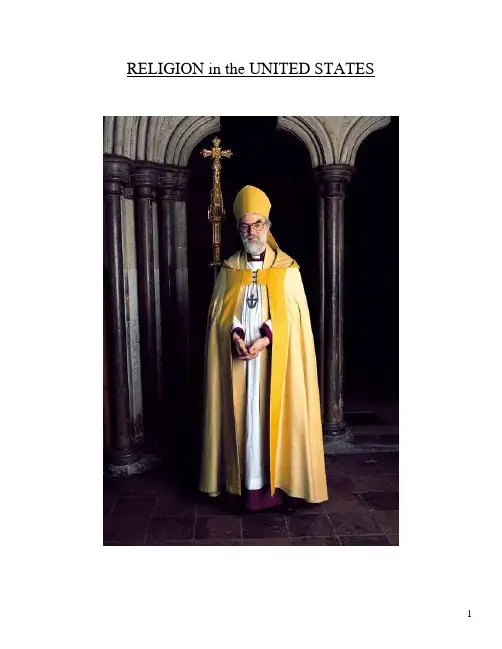
RELIGION in the UNITED STATESReligious Liberty∙“Among the rights which the new nation guaranteed, as apolitical necessity in a religiously diverse society, wasfreedom of religion” (p. 86)∙The Constitution forbade the government to give specialfavours to any religion, nor were they allowed to stop orinterfere with religion. The USA was determined it wouldhave no state-supported religion.∙When there is a disagreement between the government andany religion, the American courts must settle it. Protestants in the United States∙60% of Americans are Protestant believers. The Baptists are the largest Protestant group.* The largest concentration ofBaptists live in the Southern States of America and, although some Southern Baptists have liberal attitudes to blackAmericans, many believe and practice racial discrimination and prejudice towards them.∙Most black Americans are Baptists too, but they go todifferent churches than the white Americans. Church is amajor social and community centre for the black churchgoers. ∙There are over a 100 Protestant sects in America. Theyexpress variety on a theme, rather than major differences inbelief. In recent decades there has been an increase in thenumber of fundamentalist churches, which often use themedium of television to communicate with citizens. Thesefundamentalists are sometimes extreme in their views. Catholics∙The largest single religious group is the Roman Catholics.More than 25% of Americans identify themselves as Catholics.The increase in the number of Catholics is mainly due to laterimmigration waves of Irish, Polish and Italians. For instance, over a million Irish Catholics left Ireland, due to a famine there that saw many suffer starvation.∙There was significant prejudice against the Catholics by the Protestants. *∙In the 1950s, many Catholics began to question the idea of the separation of Church and State. The Catholic Church had developed many social institutions, including schools, to preserve their faith. The Church wanted the government to help fund the cost of these schools. The Supreme Court was asked to rule whether this would be unconstitutional. TheCourt ruled that it was unconstitutional, and that thegovernment could not help religious schools.Three Faiths∙By the 1950s, a kind of “three faiths” model of USA haddeveloped. All Americans were considered to come in one of three basic varieties: Protestant, Catholic and Jewish.∙The Jews were a small minority in the first years of theAmerican republic. Later, many Jews came to the USA and became successful. There are now many Jews in the various professions and in the academic world.Anti-Semitism appeared as the numbers of Jews grew. In response to prejudice and discrimination, Jews formed organisations to fight this. These organisations attempted to educate Americans about the injustice of prejudice.“People are complicated. They are the combinations of good and evil, beauty and ugliness, truth and falsehood, wisdom and stupidity.”He Manzi (1919- ), Chinese writer.Religious DiversityThe USA has seen the growth of many new religiousmovements. There were many experiments, both religious and otherwise, in alternative living. Sometimes communitiesdeveloped with people who wanted to …opt out‟ of mainstream society because they considered mainstream society, corrupt or lacking in moral virtue. One the most well-known is theAmish communities of Pennsylvania.∙Sometimes the beliefs and practices of these sects conflict with American law. Two instances are: the Jehovah‟s Witnesses who want to refuse to allow blood transfusions when they have medical treatment, and the Mormons who believe that a man can have more than one wife.∙The Supreme Court has been asked to make decisions about whether these practices can be allowed or not. In both cases the Supreme Court said no they are not allowable. Another decision that is very well-known was the 1973 decision whichmade abortion legal, even though many Catholics and Jewscampaigned strongly against it being legalised. There still exists a strong emotional reaction to the issue of abortion.*Other world religions have been increasing their numbers in America for example Islam, Buddhism and Hinduism due to immigration trends.American Character of ReligionThere are 3 unique aspects to American religion:∙All Americans of different religions live together under thesame law. There is no stat e interference with people‟sreligious beliefs. There is no state religion. The variousreligious groups have coexisted more harmoniously inAmerica than in the Old World.∙Religious beliefs of Americans have a strong social element to them. Half of all Protestants are active church-members, and even more Catholics attend church regularly. Many attendchurch not only for religious reasons but also to make friendsand to become a part of the community. In contrast, 80% ofEngland‟s Protestants go to church le ss than once a month and in Sweden most citizens do not go to church at all.∙Every church is a completely independent organisation. Apart from having responsibility for finance and the buildings, thepreacher preaches what he/she thinks is important rather than instilling doctrine (church teachings) into the churchgoers. Why do so many Americans attend church?∙In American history, religion has not been associated withoppression or domination by other powerful institutions.∙Generally speaking, Americans have experienced greaterreligious freedom than Europeans.∙Churchgoing in America is seen as an opportunity tobecome a part of the community and to develop friendships.Key Points∙The American government guarantees religious freedom.∙The American Protestants have a very diverse range ofchurches and sects even though they have the same basicbeliefs.∙The Catholic Church is the single largest church in the USA.When immigrants from predominately Catholic countries, like Poland, Italy and Ireland, brought their religion with them.∙There was prejudice and discrimination against the Catholics and the Jews.∙Many Americans go to church for social as well as religiousreasons.∙Attendance at church in the USA is relatively high compared with many European countries.RESULTS OF SURVEY (1995-1997)It polls a statistically valid sample of adults from a total of 60 nations. Some of their findings from their 1995-1997 survey: The United States has a higher level of church attendance than any other country which is "at a comparable level of development."53% of Americans consider religion to be very important in their lives. This compares with 16% in Britain, 14% in France and 13% in Germany.The importance of religion has been declining in developed countries.In those countries which are "experiencing economic stagnation and political uncertainty," the importance of religion is high.。
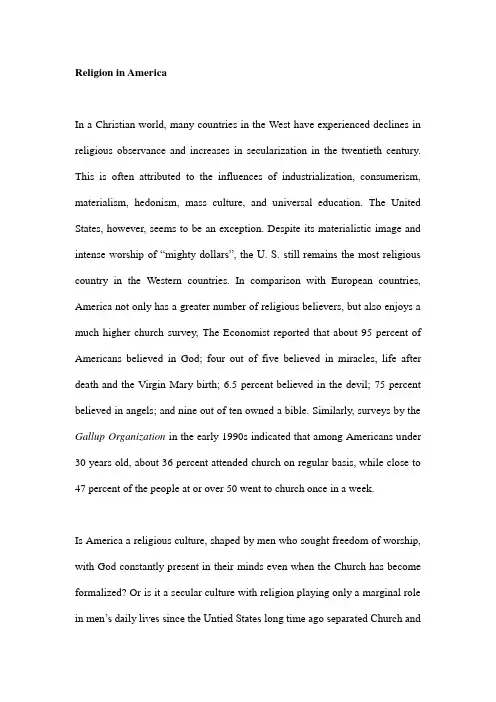
Religion in AmericaIn a Christian world, many countries in the West have experienced declines in religious observance and increases in secularization in the twentieth century. This is often attributed to the influences of industrialization, consumerism, materialism, hedonism, mass culture, and universal education. The United States, however, seems to be an exception. Despite its materialistic image and intense worship of “mighty dollars”, the U. S. still remains the most religious country in the Western countries. In comparison with European countries, America not only has a greater number of religious believers, but also enjoys a much higher church survey, The Economist reported that about 95 percent of Americans believed in God; four out of five believed in miracles, life after death and the Virgin Mary birth; 6.5 percent believed in the devil; 75 percent believed in angels; and nine out of ten owned a bible. Similarly, surveys by the Gallup Organization in the early 1990s indicated that among Americans under 30 years old, about 36 percent attended church on regular basis, while close to 47 percent of the people at or over 50 went to church once in a week.Is America a religious culture, shaped by men who sought freedom of worship, with God constantly present in their minds even when the Church has become formalized? Or is it a secular culture with religion playing only a marginal role in men’s daily lives since the Untied States long time ago separated Church andState? To answer these two questions is no less than looking into the dynamics of American culture and the complexity of American society. The fact of the matter is that each of these questions can be answered affirmatively. America is as secular as a culture can be where religion has played an important role in its origins and early growth, and has been interwoven with the founding and meaning of the society. America is also as religious as a culture can be whose life goals are worldly and whose daily strivings revolve not around God but around Man.God and ManThe mixture of theocracy and secularism is actually one of the American religious heritages. One can find the strong religious base of American life and thought in the older Puritan communities of New England and in the new frontier states. The Calvinist doctrine of predestination, for example, played a dominant role in the early colonists. People moving to the frontiers in the West were mostly inspired by the vast stretch of land available for attainment. They dreamed of getting rich quick, and at the same time tried to comfort their souls by waging religious revivals there. At the time Americans embraced Enlightenment ideas and applied them in their political, social and economic life, they still constantly referred to the Holy Scripture for conviction and reassurance. Even in the contemporary Atomic Age where science and technology has developed to an unprecedented level, there has been an activerevival of religious feeling among the American people, old and young, in modern cities. To a certain degree, this mixture of 17th-century rationalism (Science and Technology), and mid-20th-century revival may help explain some of the contradictions in the relations between God and Man in America. America is regarded as a “Christian country”. The influence of Judaic-Christian doctrines upon American culture has been profound. For example, the religious doctrine of the soul is so crucial and pervasive in Western (including American) conceptions of man that no one would deny that Judaic-Christian doctrine is a major element in shaping American national character and culture. In the minds of American Christian believers, the idea that man has a soul and that all souls are “equal before God”has been basic to the ethical evaluation of individual personality. The idea of the worth, dignity, and inviolability of the individual unquestionably owes much to this belief, as do humanitarian ideas and various philosophies of human equality.Historically speaking, the whole idea of God and individual soul goes back to the sixteenth century. As the child of the Reformation, Americans took over not only its dominantly Protestant heritage, but also its deep individualistic strain. Every European sect that had found itself constricted or in trouble emigrated to the New World, which thus became a repository of all the distillations of Reformation thought and feeling. Since the Reformation had broken with the authority of the Roman Catholic Church and left to the individual meaning of the Scripture, America became a congeries of judging individuals, each of themweighing the meaning and application of the Word. A Bible-reading people emerged, drenched in the tradition of the Old and New Testaments. This may help explain the stress on the idea of “covenant with God” in Ameri can thought. It also suggests why a people so concerned with the meaning of the Holy Writ have been the first to give a sacred character to a written Constitution but at the same time remain a nation of amateur interpreters of the Constitution.Two basic concepts of the Christian—the soul and sin—took on a new emphasis in individualist America. Each man was the judge of his own religious convictions, since his possession of an immortal soul gave such an inner worth regardless of color, rank, or station, political belief, wealth or poverty. Thus, the foundation was laid for religious freedom early on in the Untied States. On the other hand, if each man had an immortal soul to save, it was because it had been steeped in sin. As a Bible-reading people, Americans took over many of the preconceptions of the Hebraic society in which Judaism and early Christianity were rooted. Among them was the sense of individual sin—aside from original, or inevitable sin—without which there could be no individual salvation.There is a resulting ambiguity between the sin-and-salvation strain in Christian doctrine and the organic optimism of American economic and social attitudes. The Hebrew prophets, as they lamented the disintegration of Biblical society, called on each Jew to war d off God’s wrath from his people by cleansing himself of his own inner guilt; the Christian allegory added to the sombernessof this conception. But there have been few occasions on which Americans could believe with any conviction in an impending collapse of their social structure and their world. The sense of sin and the sense of doom were therefore importations from the Old and New Testaments that somehow flowered in the American soil in spite of worship of money and success, or, perhaps, exactly because of this worship, for in this case, it required a compensating doctrine to ease the conscience.The result has been an American religious tradition which is on the one hand deeply individualistic, anti-authoritarian, and concerned with sin and salvation, and yet, on the other hand, secular and rationalist in its life goals, and concerned with happiness in this world. Americans, growing up in this religious tradition, have been salvation-minded, each believer engrossed in his relation not to the church but to God, in Whom he was to find salvation. At the same time, they have also formed a secular rather than a sacred society, in which everybody pursued his earthly comforts according to his own conscience。
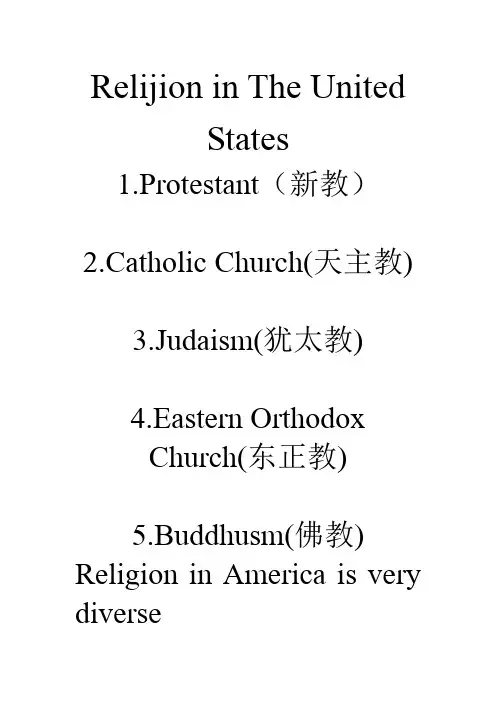
Relijion in The UnitedStates1.Protestant(新教)2.Catholic Church(天主教)3.Judaism(犹太教)4.Eastern OrthodoxChurch(东正教)5.Buddhusm(佛教) Religion in America is very diverseChristian:Protestant 51.3﹪Catholic 23.9﹪Other Christian 3.3﹪Jewish 1.7﹪Buddhist 0.7﹪Muslim 0.6﹪Hindu 0.4﹪Other 2.0﹪Unaffiliated 16.1﹪Christian Beliefs 一.The basic beliefs of the Christianlaitn,that Christians from all denominations can agree on,are that:1.Jesus is God’s son.2.Jesus came to earth as a baby,lived a perfect life,and died on a cross as a sacrifice for our sins.3.Jesus will come back again as a King.He will take his followers to live with Him in heaven.Many people in America are "deists".They believe that there is a God,but they don't think He is involved in our lives to a great extent.They don't seek God or follow Biblical teachings.Many others in America are "practicing Christians".They seek to follow God's will in their lives and often meet together with other Christians at Church meetings,42﹪American “go to church”at least once a week. American Character ofReligion1.American with different religions live together under the same law.The Bill of Right of US proved whereis no state religion and that Church and state must be separated.2.The religions beliefs of American continue to be with social progress.The majority of American pour into the Church every Sunday morning.3.Every Church in US is completely independent organization and concerned with it own finance and it’s own building.There has been little concentration on doctrine or religious argument.。
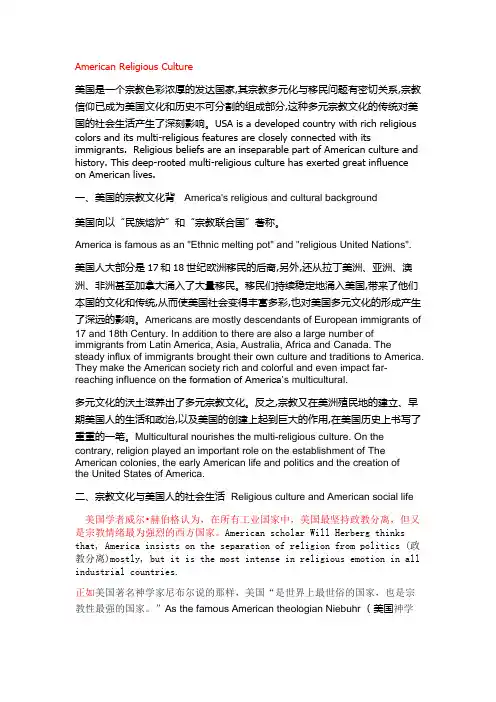
American Religious Culture美国是一个宗教色彩浓厚的发达国家,其宗教多元化与移民问题有密切关系,宗教信仰已成为美国文化和历史不可分割的组成部分,这种多元宗教文化的传统对美国的社会生活产生了深刻影响。
USA is a developed country with rich religious colors and its multi-religious features are closely connected with itsimmigrants. Religious beliefs are an inseparable part of American culture and history. This deep-rooted multi-religious culture has exerted great influenceon American lives.一、美国的宗教文化背America's religious and cultural background美国向以“民族熔炉”和“宗教联合国”著称。
America is famous as an "Ethnic melting pot" and "religious United Nations".美国人大部分是17和18世纪欧洲移民的后裔,另外,还从拉丁美洲、亚洲、澳洲、非洲甚至加拿大涌入了大量移民。
移民们持续稳定地涌入美国,带来了他们本国的文化和传统,从而使美国社会变得丰富多彩,也对美国多元文化的形成产生了深远的影响。
Americans are mostly descendants of European immigrants of17 and 18th Century. In addition to there are also a large number ofimmigrants from Latin America, Asia, Australia, Africa and Canada. Thesteady influx of immigrants brought their own culture and traditions to America. They make the American society rich and colorful and even impact far-reaching influence on the formation of America’s multicultural.多元文化的沃土滋养出了多元宗教文化。
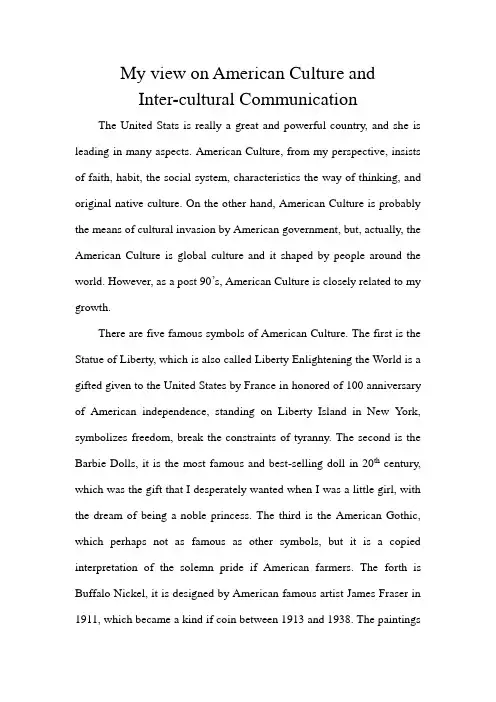
My view on American Culture andInter-cultural Communication The United Stats is really a great and powerful country, and she is leading in many aspects. American Culture, from my perspective, insists of faith, habit, the social system, characteristics the way of thinking, and original native culture. On the other hand, American Culture is probably the means of cultural invasion by American government, but, actually, the American Culture is global culture and it shaped by people around the world. However, as a post 90’s, American Culture is closely related to my growth.There are five famous symbols of American Culture. The first is the Statue of Liberty, which is also called Liberty Enlightening the World is a gifted given to the United States by France in honored of 100 anniversary of American independence, standing on Liberty Island in New York, symbolizes freedom, break the constraints of tyranny. The second is the Barbie Dolls, it is the most famous and best-selling doll in 20th century, which was the gift that I desperately wanted when I was a little girl, with the dream of being a noble princess. The third is the American Gothic, which perhaps not as famous as other symbols, but it is a copied interpretation of the solemn pride if American farmers. The forth is Buffalo Nickel, it is designed by American famous artist James Fraser in 1911, which became a kind if coin between 1913 and 1938. The paintingson American traditional coin is mainly all previous president. But Buffalo Nickel didn’t follow, it print two images which was close to extinguish in American westward movement to commemorate----American buffalo and Native American. The last one is Uncle Sam, the artwork was created in 1917 as a recruiting poster for the U.S Army, At the time, the US was in need of more troops to help fight World War I. Later Uncle Sam was used to refer to America or American government, and it was widely used in press.With more frequent cooperation, there are countless similarities between our Chinese Culture and American Culture. For example, we have different culture background, China has a 5000-year-history but the U.S has a merely 2000-year-history. So the difference is enormous and it is the gap between our two nations’communication. Due to different social culture, difference in the way we think is also a huge one. Chinese prefer to be comprehensive and stress holistic idea, however American turn to be analytically and individual priority. Customs discrepancy greatly affects our intercourse. Obviously, most Chinese people used to treat dog as a derogatory term however American people has lucky dog. Buddhism deeply rooted in Chinese culture and had a huge impact on Chinese literature. On the contrary, Christianity is the mainstream of American religion, also deeply rooted in American culture. The American Christianity is a secularized religion, stressing private faith and pluralismof religion. In addition, difference in diet culture is also a part of our two nations’ culture difference.Though there are numerous differences, with the high pace of development of economic globalization, people in two nations never stop filling the gap. The effort is not unilateral compromise, but joint effort, aiming at smooth communication. American start to love Chinese food, Chinese traditional art, Chinese Kongfu and even living in China. At the same time, in China, KFC, McDonald’s, Pizza Hut are everywhere, Chinese hold the most Iphone around the world, American blockbuster is the first choice when Chinese step into the movie theater, and Ford and GM aiming at China as the biggest market. The most important is Chinese dama is buying the world including the United States.From the comparison and contrast, we can promote our culture development, improve our own value system, broaden our horizons, meanwhile, make our culture global.For me, the Statue of Liberty is really impressive. The spirit to pursue freedom and break the constraints of tyranny inspires me to bear a good character and ethics, thus, becoming more firm to fight for my rights and more tough to face each challenge.All in all, nowadays, Chinese culture and American culture share closely inter-culture communication, and I believe both side will have a bright and prosperity future.。
Chapter 4Religion in the United StatesI. American history and religious liberty---history―WASP‖(央格鲁撒克逊白人新教文化), which stands for ―White Anglo-Saxon Protestant‖, is believed to be the basis of the mainstream culture of the United States.-- Although the Church of England was an established church in several colonies, Protestants lived side by side in relative harmony.(英国国教虽然在几个殖民地是官立教会,但新教各派都能和平相处.) They had began to influence each other. The Great Awakening of the 1740s, a ―revival ‖ movement which sought to breathe new feeling and strength into religion, cut across the lines of Protestant religious groups, or denominations.(18世纪40年代的宗教大复兴运动力图把新的感觉和新的力量注入北美各殖民地人民的宗教信仰中去。
这次“复兴”运动打破了新教各派的界限。
)--John Locke reasoned that the right to govern comes from a n agreement or ―social contract‖ voluntarily entered into by free people. The Puritan experience in forming congregations(圣会) made this idea seem natural to many Americans.-- Influenced by the new science and new ideas of the Enlightenment in Europe, a few Americans became deist(自然神论者), believing that reason teaches that God exists but leaves man free to settle his own affairs.-- Many traditional Protestants and deists could agree that all men are created equal, that they are endowed by their creator with certain unalienable(不能被剥夺的) rights and that the laws of Nature and Nature’s God(创造自然的上帝) entitled them to form a nation.---religious liberty– The Declaration of Independence guaranteed the basic right of religious freedom and this right was a political necessity. The First Amendment to the U.S Constitution explicitly forbade the federal government to give special favors to any religion or to hinder the free practice, or exercise, of religion. When disputes about the relationship between government and religion arise, American courts must settle them. But American institutions presuppose a Supreme being (美国的社会风俗习惯都是以上帝的存在为前提的), therefore Christianity is often in practice, more favored than other religions.II. the Three Faiths in the U.S--- 1. Protestant (Over 60% of Americans are said to be Protestant believers. )-- The Baptists(浸礼教徒) are the largest Protestant group in America. They believe in adult baptism by immersion, symbolizing a mature and responsible conversion experience(主张成人全身浸水,以表示成熟负责任的皈依经历。
《英语国家概况》课程教学大纲课程编号:B0715110课程名称:英语国家概况总学时:32适用对象:英语专业本科三年级学生先修课程:基础英语,英语口语,英语听力,英语语音,英语写作后续课程:英美文学一、课程性质、目标与任务1.课程类型:必修课√□选修课□公共课□专业基础课□专业课√□集中实践教学环节□2.课程性质:纯实践课□纯理论课□实践为主课□理论为主课√□理实一体化□3.课程目标及任务《英语国家概况》是介绍英语国家社会与文化入门的一门课程。
开设本课的目的在于使学生通过学习,了解英美国家的历史、地理、社会、经济、政治、教育等方面的情况及其文化传统,内容庞杂、信息量大。
培养学生正确分析有关英美等国问题的能力,并能以正确的眼光看待世界上所发生的问题,提高学生对文化差异的敏感性、宽容性和处理文化差异的灵活性,培养学生跨文化交际能力。
把学生培养成为高素质的人才,同时又能爱祖国、热爱社会主义,致力为祖国的繁荣、发达而努力的人才,培养学生树立正确世界观。
同时,通过课文的学习和各种练习的实践,达到提高英语水平的目的。
通过比较学习不同文化中具有特殊文化涵义的词语与表达式,可以促使学生掌握一些特殊词语的深层次意义,是对词汇的学习以及翻译水平的提高的有益补充;通过开展中外文化的比较,让学生切身感受到成功的交际仅有语言是远远不够的,文化方面的因素有时所起的作用远远大于语言本身,必将为英语学习者成功地参与国际商务活动,更有效地进行国际合作与交流打下坚实的文化基础。
二、课时分配三、教学组织Unit One Introduction to the UK[教学目标与要求]:Understanding of:1 geographical features, climate2 characteristics of the UK3 history of the UK4distribution of the UK’s population[本章主要内容]:1 geographical features, climate2 characteristics of the UK3 history of the UK4distribution of the UK’s population[本章重点]:1 features of invasion of the UK2 the Great Empire, gentleman[本章难点]:Troubles in the Northern Ireland[本章思考题]:1.What is gentleman?2.The influences of the Great EmpireUnit Two The government of the UK[教学目标与要求]:Understanding of:1 Constitutional Monarchy2 British parliament and its functions3 British government[本章主要内容]:1 Constitutional Monarchy2 British parliament and its functions3 British government[本章重点]:1 Constitutional Monarchy2 British parliament and its functions[本章难点]:Constitutional Monarchy[本章思考题]:1.How long do you think the royal family can exist?Unit Three Politics, class and race[教学目标与要求]:Understanding of:1 understanding of the general election of the UK2 social class3 races[本章主要内容]:1 understanding of the general election of the UK2 social class3 races[本章重点]:1 the general election of the UK2 multiracial society[本章难点]:the general election of the UK[本章思考题]:1.The system of general elections and its influence in the worldUnit Four The UK economy[教学目标与要求]:Understanding of:1 understanding the position of the UK after the WW II2. the reason of the decline3 characteristics of British agriculture and industry[本章主要内容]:1 understanding the position of the UK after the WW II2. the reason of the decline3 characteristics of British agriculture and industry[本章重点]:1 the reasons for the decline2.the trends for the British economy[本章难点]:the reasons for the decline he general election of the UK[本章思考题]:1.The privatization and reform in the economic developmentUnit Five British literature[教学目标与要求]:Understanding of:1 the history of British literature2 writers3 schools4 divisions of literal periods[本章主要内容]:1 the history of British literature2 writers3 schools4 divisions of literal periods[本章重点]:1 the history of British literature2 well-known writers[本章难点]:divisions of literal periods[本章思考题]:1.Describe a writer/ a school/work you are most familiar with?Unit Six British education system[教学目标与要求]:Understanding of:1 the history of education2 education systems3 higher education[本章主要内容]:1 the history of education2 education systems3 higher education[本章重点]:1 the history of education2 education systems[本章难点]:higher education[本章思考题]:1.Compare British and Chinese higher educationUnit Seven British Foreign Relations[教学目标与要求]:Understanding of:1 UK foreign policies and their makings2 Britain and international institutions3 Britain and the United States[本章主要内容]:1 UK foreign policies and their makings2 Britain and international institutions3 Britain and the United States[本章重点]:1 UK foreign policies and their makings2 Britain and the United States[本章难点]:Britain and the United States[本章思考题]:1.The change of British image in international world from Iraqi warUnit Eight the British Media[教学目标与要求]:Understanding of:1 British newspapers2 broadcast media3 television media[本章主要内容]:1 British newspapers2 broadcast media3 television media[本章重点]:1 British newspapers2 broadcast media[本章难点]:British newspapers[本章思考题]:1.The functions of media in cultural acquisitionUnit Nine American beginnings[教学目标与要求]:Understanding of:1 a new land2 the settlement in Virginia3 Puritan New England4 Catholic Maryland5 Quaker Pennsylvania6 American revolution[本章主要内容]:1 a new land2 the settlement in Virginia3 Puritan New England4 Catholic Maryland5 Quaker Pennsylvania6 American revolution[本章重点]:1 A new land2 American revolution[本章难点]:American revolution[本章思考题]:1.How did modern development in Europe influence the settlement of North American colonies?Unit Ten Political system in the United States[教学目标与要求]:Understanding of :1 legislative branch2 executive branch3 Judicial branch4 political parties[本章主要内容]:1 legislative branch2 executive branch3 Judicial branch4 political parties[本章重点]:1 Checks and balance2 Political parties[本章难点]:checks and balance[本章思考题]:Compare the political systems between the UK and the USAUnit Eleven American economy[教学目标与要求]:understanding of:1.industry revolution2.free enterprise3 . American agriculture[本章主要内容]:1.industry revolution2.free enterprise3. American agriculture[本章重点]:1 free enterprise2. the roots of affluence[本章难点]:the roots of affluence[本章思考题]:The influences of American economy on the worldUnit Twelve Religion in the USA[教学目标与要求]:understanding of:1 religious liberty2. protestants in the USA3. Catholics in the USA[本章主要内容]:1 religious liberty2. protestants in the USA3. Catholics in the USA[本章重点]:1 religious liberty2 religious diversity[本章难点]:American character of religion[本章思考题]:The effects of religion on American culture and everyday lifeUnit Thirteen American literature[教学目标与要求]:Understanding of:1 the history of American literature2 writers3 schools4 divisions of literal periods[本章主要内容]:1 the history of American literature2 writers3 schools4 divisions of literal periods[本章重点]:1 the history of American literature2 well-known writers[本章难点]:divisions of literal periods[本章思考题]:Describe a writer/ a school/work you are most familiar with?Unit Fourteen Education system in the United States[教学目标与要求]:Understanding of:1 the history of education2 education systems3 higher education[本章主要内容]:1 the history of education2 education systems3 higher education[本章重点]:1 the history of education2 education systems[本章难点]:higher education[本章思考题]:1.Why American schools have more international students than any other countries?Unit Fifteen Social problems in the USA[教学目标与要求]:Understanding of:1 racial problems2 drug abuse3 crimes4.abuse of power by government and corporation[本章主要内容]:1 racial problems2 drug abuse3 crimes4.abuse of power by government and corporation[本章重点]:1 racial problems2 drug abuse[本章难点]:racial problems[本章思考题]:Why is it perceived as a major threat to American society?Unit Sixteen Post-WWII American foreign policy[教学目标与要求]:understanding of:1 the beginning of the cold war2 arm races3 the engagement and expansion[本章主要内容]:1 the beginning of the cold war2 arm races3 the engagement and expansion[本章重点]:1 the cold war2 the engagement and expansion[本章难点]:the cold war[本章思考题]:The current international relationships and the role America plays in it四、课程考核学生总评成绩取决于学生的出勤情况、课堂参与、学期论文、课后作业和期末考试成绩。
宗教用英语怎么说宗教是人类社会发展到一定历史阶段出现的一种文化现象,属于社会特殊意识形态。
旧时由于人对自然的未知探索,以及表达人渴望不灭解脱的追求,进而相信现实世界之外存在着超自然的神秘力量或实体,使人对该一神秘产生敬畏及崇拜,从而引申出信仰认知及仪式活动体系,与民间神话一样,其也有自己的神话传说,彼此相互串联,其是一种心灵寄托。
那么你知道宗教用英语怎么说吗?下面来学习一下吧。
宗教的英语说法1:religion宗教的英语说法2:religious宗教的相关短语:宗教学religious studies ; Science of Religion ; Study of religion ; Religion宗教自由 freedom of religion ; Religious freedom ; Freedom of worship ; Religious liberty美国宗教Religion in the United States ; Religion in USA ; American Religious Identity Survey ; Religion in America 澳门宗教 religion in Macau台湾宗教 Taiwanese Religions中国宗教 Religion in China ; Chinese religion宗教迫害 Religious persecution反宗教 Antireligion各国宗教 Religions by country宗教的英语例句:1. She was a fairly rigid person who had strong religious views.她相当顽固,宗教观念极强。
2. India has always been one of the most religiously diverse countries.印度一直都是宗教信仰最多元的国家之一。
AmericanReligionAbstract:It is said that American religion,as a great part of American culture,plays an important role in American culture. It is hoped that some ideas can be obtained from this research paper,which focuses on analyzing the great impact is produced to American culture by American religion. Finally, this essay gives two useful standpoints to English learners:Understanding American religion will help understand the American history,culture and American people,and help you to communicate with them better.Understanding American religion will help you understand English better.Key words:American culture Hebrew culture Greek culture Roman cultureThe Bible American history American religion Christianity English1. American culture1.1 American cultureAmerican religion is a great part of American culture,the latter is a branch of European culture,which derives from Hebrew culture,Greek culture, and Roman culture.The feature of Hebrew culture is religion. The important book of it is The Bible , which has two parts: Old Testament and New Testament. The Old Testament was written in Hebrew language,which is talking about the history of the Hebrews and reflects their religion. Abraham, Isaac, Jacob, Moses and David are mentioned in Old Testament.The New?Testamentwas mainly written in Greek language. In it, the Christ was born, and was stuck to the cross for saving the Human Beings. The Bible is an influential book in American culture.1.2 American religion1.2.1 The position of American religion in American cultureAmerican religion plays an important role in American culture. America is a typical religious country. 90% of American people have their own religion. Nearly 78% of American people pray at least one time per week; nearly 50% pray one time every day. They even print “in god we trust” on bills. So Religion is a great power in American society and culture, which also influences its diplomacy.According to a survey in 1988,“Among ten Americans, nine will say they never doubt about the existence of God; eight will say they will be judged by the God after they died and they believe that God is still giving us miracles now;and seven thinkthey will have a next life.” In addition 88% believe in God’s love; 78% will say they have spent much or a lot of time on thinking their relationship with God; and 86% say they hope their children will accept religion training in the future. They will say they have sensed the power of God and they have a deep eagerness for God. Americans spend more time and more money on religion than on other things.1.2.2 Groups of American religionChristianity is a kind of religion that regards Jesus Christ as the Saviour. Roman Catholicism, Protestant churches and Easten Orthodoxy all can be called as Christianity.With times passed by, more and more people immigrated into America with various religions. Now, The major religions in America are Protestant churches, Roman Catholicism, Muslims, Islam, Judaism, Hindus, Buddhism, Daoism and so on.Christian morals and ethics unite the American society. The things American people are proud of are not their advanced technologies, strong economy and powerful military forces, but their Christian morals and ethics and their value of God selecting its people, so they think everyone is equal and they pursue democracy and freedom.Some of American festivals are related to Christian religion, such as St. Valentine’s Day,St. Patrick’s Day, Easter andChristmas.Then, only when you understand American religion---especially Christian religion can you understand America, and can you communicate with American people better.There are some examples: Some powerful and high-status Chinese went to America. Because of their bad English and their working experience at home is not acce pted by the Americans, they couldn’t find jobs. Then others suggested them to go to the church where they can make friends. At first they didn’t believe it, but gradually they began to be accustomed to going to the church and they felt Christian religion is good and became Christians. Little by little they mixed together with the Americans and they could find jobs to afford their living expenses or even live better.2.2 Understanding American religion will help you understand English better.You can learn English well by communicating with Americans if you understand their Christian religion.In addition, there are a lot of words and phrases coming from The Bible, such as the followings:a dead dog废物或无价值的东西;Judas’Kiss犹大的吻(可耻的叛徒);Let the dead bury their dead.既往不咎;out-Herod Herod比希律王还要希律王(有过之而无不及);the apple of one’s eye掌上明珠;wolf in sheep’s clothing 披着羊皮的狼;eye for eye,tooth for tooth以眼还眼,以牙还牙;wash one’s hands of a thing洗手不干;new wine in old bottles旧瓶装新酒, etc.In a word, if you want to learnEnglish better, you should understand American religion.References:[1]/ruvolo.htm, 2008-1-4.[2]/carolrb/christianity/christian_festivals.html, 2008-1-7.[3]/jidianlinks/cd/xzm2.htm, 2008-1-4.[4]/01/4815/163091745.htm, 2008-1-5.[5]/vri/america.html, 2008-1-4.[6]/customs/questions/festivals.html, 2008-1-7.[7]/american_culture.htm, 2008-1-3.[8]/chinese/zhuanti/172146.htm, 2008.[9]/yeshua/culture/culture.htm, 2008.[10]/romeculture.html, 2008-1-3.[11]/JT_Z/FuYinFuLu/XinYangSiSuo/JiDuJiaoYuMeiGuoWenHu a/index.html, 2008-1-5.[12]/Bible-summary.html, 2008-1-7.[13]/New-Testament-Survey.html, 2008.[14]/Old-Testament-Survey.html, 2008-1-7.[15]/articles/native-american-culture.html, 2008-1-3.[16]/NativeAmerican.htm, 2008.[17]/news/view.asp?id=1494, 2008-1-5.[18]/reader/b_fuyinziliaowenzhai/chapter075.html,2008-1-4.[19]/reader/b_ifnobible/chapter06.html, 2008-1-5.[20]/emuseum/cultural/oldworld/europe/ancient_roman_culture.html, 2008-1-3.[21]/hr/equalities/religious_calendar.php,2008-1-7.[22]/jiaoliu/jl0100/immigration.html, 2008-1-4.[23]/jiaoliu/jl0100/place.html, 2008-1-4.[24]/jiaoliu/jl0100/redefine.html, 2008-1-4.[25]/htm/zlsh/zjyj/2004-03-13-16320.htm, 2008-1-4.。